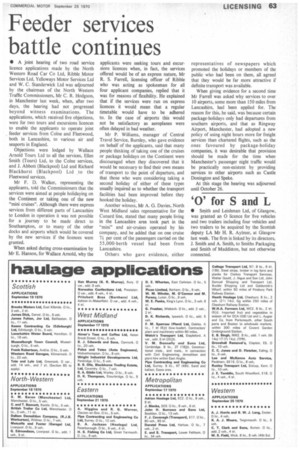Feeder services battle continues
Page 65

If you've noticed an error in this article please click here to report it so we can fix it.
• A joint hearing of two road service licence applications made by the North Western Road Car Co Ltd, Ribble Motor Services Ltd, Yelloways Motor Services Ltd and W. C. Standerwick Ltd was adjourned by the chairman of the North Western Traffic Commissioners, Mr C. R. Hodgson, in Manchester last week, when, after two days, the hearing had not progressed beyond witness examinations. The applications, which received five objections, were for two tours and excursions licences to enable the applicants to operate joint feeder services from Colne and Fleetwood, both in Lancashire, to various air and seaports in England.
Objections were lodged by Wallace Arnold Tours Ltd to all the services, Ellen Smith (Tours) Ltd, to the Colne services, and J. Abbott (Blackpool) Ltd and Richard Blackhurst (Blackpool) Ltd to the Fleetwood services.
Mr F. D. Walker, representing the applicants, told the Commissioners that the services were aimed at people holidaying on the Continent or taking one of the new "mini cruises". Although there were express services from different parts of Lancashire to London in operation it was not possible for a journey to be made direct to Southampton, or to many of the other docks and airports which would be covered by the new services if the licences were granted.
When asked during cross-examination by Mr E. Hanson, for Wallace Arnold, why the
applicants were seeking tours and excursions licences when, in fact, the services offered would be of an express nature, Mr R. S. Farrell, licensing officer of Ribble who was acting as spokesman for all four applicant companies, replied that it was for reasons of flexibility. He explained that if the services were run on express licences it would mean that a regular timetable would have to be adhered to. In the case of airports this would not be satisfactory as aeroplanes were often delayed in bad weather.
Mr P. Williams, manager of Central Travel Service, Burnley, who gave evidence on behalf of the applicants, said that many people thinking of taking one of the cruises or package holidays on the Continent were discouraged when they discovered that it would be necessary to find their own means of transport to the point of departure, and that those who were considering taking a second holiday of either of these types usually inquired as to whether the transport facilities had been improved before they booked the holiday.
Another witness, Mr A. G. Davies, North West Midland sales representative for the Cunard line, stated that many people living in the Lancashire area took part in the "mini" and air-cruises operated by his company, and he added that on one cruise 74 per cent of the passengers carried on the 55,000-berth vessel had been from Lancashi re.
Others who gave evidence, either representatives of newspapers which promoted the holidays or members of the public who had been on them, all agreed that they would be far more attractive if definite transport was available.
When giving evidence for a second time Mr Farrell was asked why services to over 10 airports, some more than 150 miles from Lancashire, had been applied for. The reason for this, he said, was because certain package-holidays only had departures from southern airports, and that as Ringway Airport, Manchester, had adopted a new policy of using night hours more for freight services than chartered flights, such as the ones favoured by package-holiday companies, it was desirable that provision should be made for the time when Manchester's passenger night traffic would be practically non-existent by providing services to other airports such as Castle Donington and Speke.
At this stage the hearing was adjourned until October 26.


























































































































































































